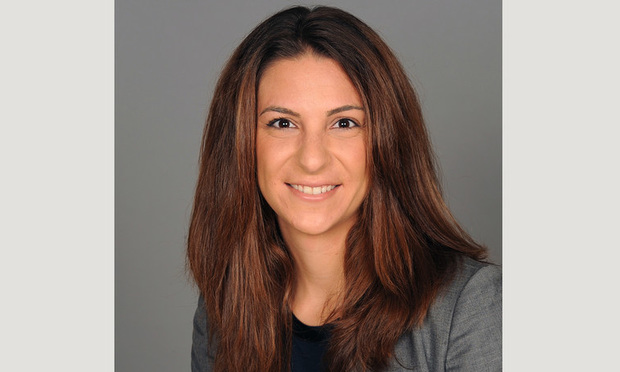5 Tips for Incorporating Mindfulness into Your Legal Practice
Mindfulness practices have known therapeutic benefits that I've seen firsthand as a lawyer and practicing yoga instructor.
March 08, 2019 at 05:07 PM
5 minute read
 Jennifer Cormano is an associate in Nixon Peabody's Los Angeles office (Photo: Courtesy Photo)
Jennifer Cormano is an associate in Nixon Peabody's Los Angeles office (Photo: Courtesy Photo)
When I talk with lawyers about having a daily practice of mindfulness, meditation or yoga, there's often resistance to add yet another activity to their already hectic schedules. But these practices have known therapeutic benefits that I've seen firsthand as a lawyer and practicing yoga instructor. Studies show that meditation leads to growth in areas of the brain important for learning, memory, emotional regulation, perspective taking and compassion. Simply put, it's worth the time.
Here are some ways you can incorporate these activities into your daily life:
Start small. Pick a short meditation you'll be able to complete regularly. There are many types of meditation but, at its core, meditation is the act of concentrating your mind on one point of focus. Value the quality of the time and the number of days you practice rather than the amount of time you spend practicing on any one given day. A great starting point is a focused breathing meditation. Start by sitting or lying down. If you are sitting, be sure your feet are flat on the ground with your legs uncrossed. Your hands can be in a comfortable position with your arms unfolded. Close your eyes and take a deep breath in while slowly counting to three. The goal is to time your breath so that you have inhaled as much as possible as you reach the number three. Then exhale while counting to three. Again, the goal is to have exhaled as much as possible as you reach the number three. Repeat this for as many breaths as you'd like. If your mind wanders at any time, gently bring your focus back and start where you left off. Another option is a body scan meditation. You can hear a session I led with the Live & Law in LA podcast.
Attach your practice to something you already do and/or schedule it. The best way to be consistent is to build a short practice around your current activities. For example, doing the above breathing meditation for five breaths before getting out of the car when you arrive at the office and/or before getting out of the car when you arrive home. Another alternative is to turn something you do daily into a mindfulness exercise. Mindfulness is the act of observing one's physical, mental and emotional states in the current moment without judgment. For example, if I mindfully brush my teeth, I slow down the activity and focus on the feel of the brush on my teeth or the taste of the toothpaste without deciding if I like or dislike it.
Track your progress and commit to being consistent. In order to get the most from your practice, it's important to be consistent with some form of practice. Studies that focus on changes to the brain in connection with mindfulness, yoga and meditation, all show these benefits take place when the exercises are done consistently. Put time on your calendar or use an app to track your consistency. If client demands or other personal needs come up, that's okay, but reschedule your practice time in the same day rather than cancelling altogether. If you miss a day or two, it's okay, just pick it up the next day. This isn't about being perfect every day—just completing your practice most days.
Grow your practice slowly over time. When you first start out with your new practice, put a reminder in your schedule every week or two to check-in and determine if it's time to increase your practice time. For example, if you started with five focused breaths before getting out of the car when you arrived at the office, try ten breaths after a week's time. After another week, try 15. When the number gets too high to count easily, try moving to a timed meditation by setting an alarm for three to five minutes. Then each week increase your time by 15 to 30 seconds until you reach your desired length.
Be forgiving and patient with yourself and your practice. Lawyers are often perfectionistic and whatever we do, we want to be the best. As a result, we can be incredibly critical of our performance. When I first started my daily meditation practice, it felt like I was failing because I found it difficult to get it in every day. My yoga teacher suggested I try changing the time of day I meditated, but, more importantly, that I go easy on myself. Give yourself the same permission to be a beginner and investigate different options. The end goal is to create a consistent practice that works best for you.
Jennifer Cormano is an associate in Nixon Peabody's Los Angeles office. She represents both nonprofit and for-profit health care providers, including hospitals, physician groups, academic medical centers, surgery centers, accountable care organizations, and other organizations affiliated with the health care industry. Her practice focuses on hospital/physician alignment strategies, corporate governance and formation matters, joint ventures, mergers, acquisitions and other strategic transactions. The information outlined above does not constitute legal advice and is meant solely for educational purposes.
This content has been archived. It is available through our partners, LexisNexis® and Bloomberg Law.
To view this content, please continue to their sites.
Not a Lexis Subscriber?
Subscribe Now
Not a Bloomberg Law Subscriber?
Subscribe Now
NOT FOR REPRINT
© 2025 ALM Global, LLC, All Rights Reserved. Request academic re-use from www.copyright.com. All other uses, submit a request to [email protected]. For more information visit Asset & Logo Licensing.
You Might Like
View All


Starbucks Hands New CLO Hefty Raise, Says He Fosters 'Environment of Courage and Joy'

Buchalter Hires Longtime Sheppard Mullin Real Estate Partner as Practice Chair
Trending Stories
- 1Digital Assets and the ‘Physical Loss’ Dilemma: How the Fourth Circuit’s Ruling on Crypto Theft Stands at Odds With Modern Realities
- 2State's Expert Discovery Rules Need Revision
- 3O'Melveny, White & Case, Skadden Beef Up in Texas With Energy, Real Estate Lateral Partner Hires
- 4Chamberlain Hrdlicka Taps a New Leader as Firm Follows Succession Planning Path
- 5Smaller Firms in 'Growth Mode' as Competition, Rates Heat Up
Who Got The Work
J. Brugh Lower of Gibbons has entered an appearance for industrial equipment supplier Devco Corporation in a pending trademark infringement lawsuit. The suit, accusing the defendant of selling knock-off Graco products, was filed Dec. 18 in New Jersey District Court by Rivkin Radler on behalf of Graco Inc. and Graco Minnesota. The case, assigned to U.S. District Judge Zahid N. Quraishi, is 3:24-cv-11294, Graco Inc. et al v. Devco Corporation.
Who Got The Work
Rebecca Maller-Stein and Kent A. Yalowitz of Arnold & Porter Kaye Scholer have entered their appearances for Hanaco Venture Capital and its executives, Lior Prosor and David Frankel, in a pending securities lawsuit. The action, filed on Dec. 24 in New York Southern District Court by Zell, Aron & Co. on behalf of Goldeneye Advisors, accuses the defendants of negligently and fraudulently managing the plaintiff's $1 million investment. The case, assigned to U.S. District Judge Vernon S. Broderick, is 1:24-cv-09918, Goldeneye Advisors, LLC v. Hanaco Venture Capital, Ltd. et al.
Who Got The Work
Attorneys from A&O Shearman has stepped in as defense counsel for Toronto-Dominion Bank and other defendants in a pending securities class action. The suit, filed Dec. 11 in New York Southern District Court by Bleichmar Fonti & Auld, accuses the defendants of concealing the bank's 'pervasive' deficiencies in regards to its compliance with the Bank Secrecy Act and the quality of its anti-money laundering controls. The case, assigned to U.S. District Judge Arun Subramanian, is 1:24-cv-09445, Gonzalez v. The Toronto-Dominion Bank et al.
Who Got The Work
Crown Castle International, a Pennsylvania company providing shared communications infrastructure, has turned to Luke D. Wolf of Gordon Rees Scully Mansukhani to fend off a pending breach-of-contract lawsuit. The court action, filed Nov. 25 in Michigan Eastern District Court by Hooper Hathaway PC on behalf of The Town Residences LLC, accuses Crown Castle of failing to transfer approximately $30,000 in utility payments from T-Mobile in breach of a roof-top lease and assignment agreement. The case, assigned to U.S. District Judge Susan K. Declercq, is 2:24-cv-13131, The Town Residences LLC v. T-Mobile US, Inc. et al.
Who Got The Work
Wilfred P. Coronato and Daniel M. Schwartz of McCarter & English have stepped in as defense counsel to Electrolux Home Products Inc. in a pending product liability lawsuit. The court action, filed Nov. 26 in New York Eastern District Court by Poulos Lopiccolo PC and Nagel Rice LLP on behalf of David Stern, alleges that the defendant's refrigerators’ drawers and shelving repeatedly break and fall apart within months after purchase. The case, assigned to U.S. District Judge Joan M. Azrack, is 2:24-cv-08204, Stern v. Electrolux Home Products, Inc.
Featured Firms
Law Offices of Gary Martin Hays & Associates, P.C.
(470) 294-1674
Law Offices of Mark E. Salomone
(857) 444-6468
Smith & Hassler
(713) 739-1250






